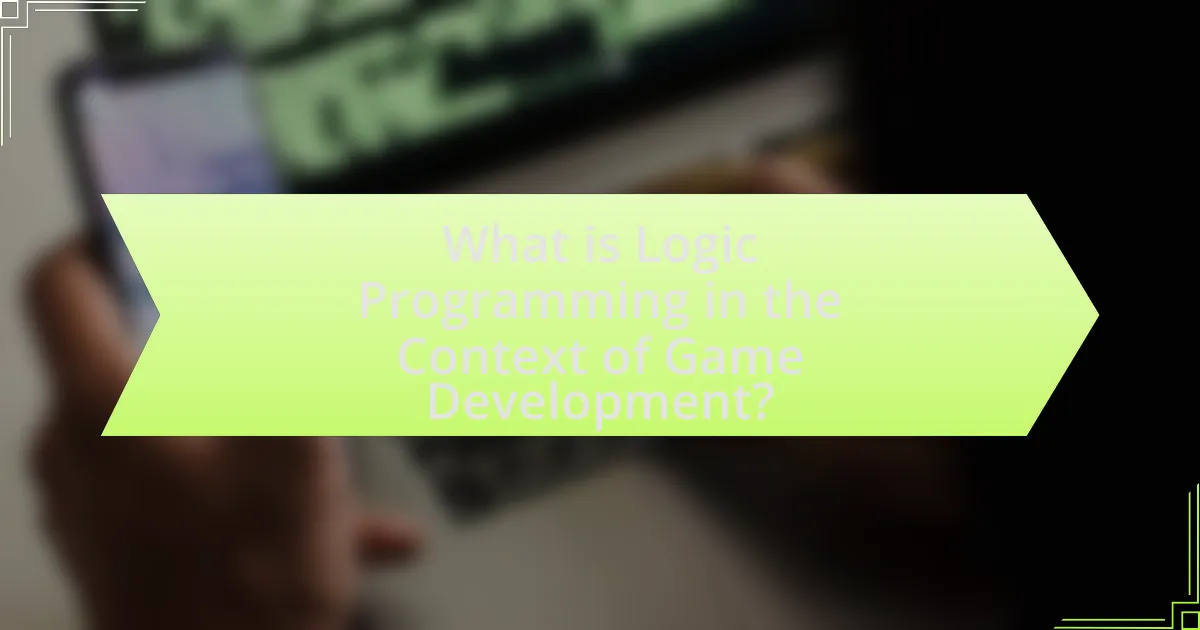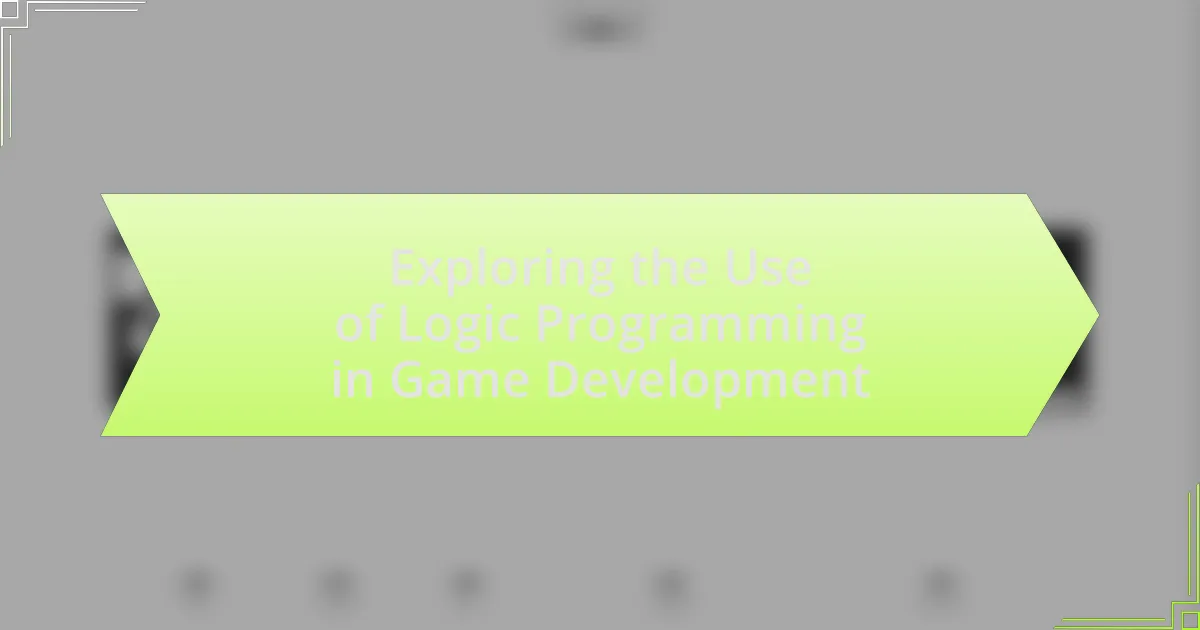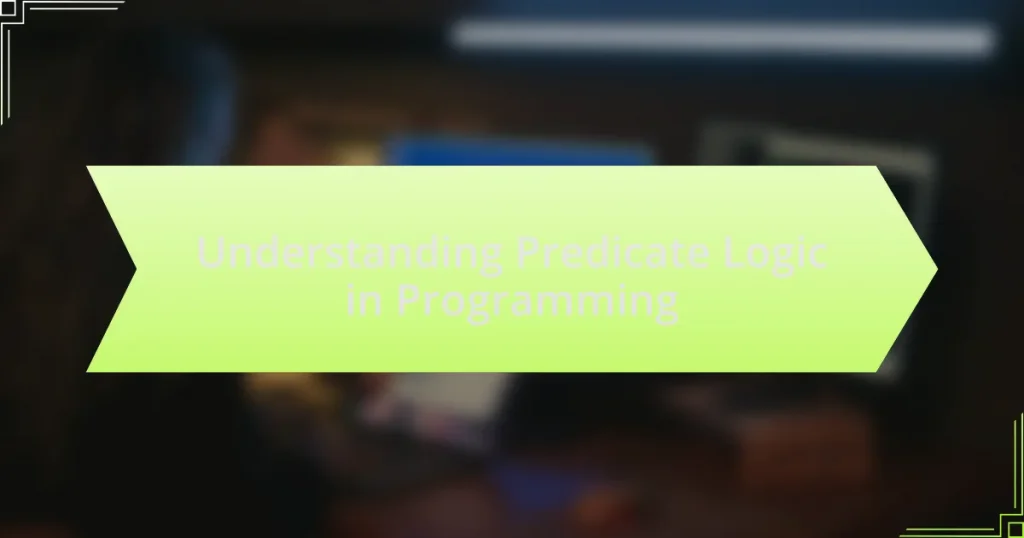Logic programming is a programming paradigm that utilizes formal logic to define game rules and behaviors, significantly impacting game development, particularly in artificial intelligence (AI) and procedural content generation. This article explores the principles of logic programming, its advantages over other programming paradigms, and its applications in creating dynamic game environments and complex AI behaviors. Key features such as declarative problem-solving and efficient backtracking are discussed, along with the challenges developers face, including performance issues and debugging complexities. The article also highlights future trends in logic programming, including its integration with machine learning and emerging gaming platforms, providing best practices for developers to enhance their game design processes.

What is Logic Programming in the Context of Game Development?
Logic programming in the context of game development is a programming paradigm that uses formal logic to express program statements and control the flow of execution. This approach allows developers to define game rules and behaviors declaratively, enabling easier manipulation of game states and interactions. For instance, logic programming languages like Prolog facilitate the creation of complex AI behaviors by allowing developers to specify relationships and rules that govern character actions, which can lead to more dynamic and responsive gameplay experiences. The effectiveness of logic programming in game development is evidenced by its application in various games that require sophisticated decision-making processes, such as strategy games and puzzle games, where logical inference is crucial for gameplay mechanics.
How does Logic Programming differ from other programming paradigms in game development?
Logic programming differs from other programming paradigms in game development by emphasizing the use of formal logic to express program statements, which allows for declarative problem-solving rather than procedural coding. In contrast to imperative programming, where developers specify the steps to achieve a goal, logic programming focuses on defining relationships and rules, enabling the system to infer solutions. This paradigm is particularly beneficial in scenarios like AI behavior modeling and puzzle-solving, where complex relationships can be expressed succinctly. For instance, Prolog, a prominent logic programming language, allows developers to create rules that the engine can use to derive conclusions, making it easier to manage dynamic game states and interactions compared to traditional object-oriented or functional programming approaches.
What are the fundamental principles of Logic Programming?
The fundamental principles of Logic Programming include the use of formal logic to express computations, the representation of knowledge in the form of facts and rules, and the execution of programs through a process of logical inference. Logic Programming is based on the idea that a program is a set of logical statements, where the computation is performed by querying these statements to derive conclusions. This approach allows for declarative programming, where the focus is on what the program should accomplish rather than how to achieve it. The validity of these principles is supported by the success of languages like Prolog, which utilize these concepts to solve complex problems in various domains, including artificial intelligence and game development.
How does Logic Programming facilitate problem-solving in games?
Logic programming facilitates problem-solving in games by enabling the representation of complex game rules and relationships in a formal, logical manner. This approach allows developers to define game mechanics and scenarios using logical statements, which can be easily manipulated and queried. For instance, Prolog, a common logic programming language, allows for the creation of rules that can infer new information based on existing facts, making it suitable for developing AI behaviors and decision-making processes in games. The ability to express conditions and constraints succinctly leads to more efficient problem-solving, as the logic engine can automatically deduce outcomes and optimize gameplay scenarios.
What are the key features of Logic Programming that benefit game developers?
Logic programming offers several key features that benefit game developers, including declarative problem-solving, efficient backtracking, and the ability to handle complex relationships. Declarative problem-solving allows developers to define what the game should accomplish without specifying how to achieve it, simplifying the coding process. Efficient backtracking enables the exploration of multiple game states and scenarios, which is crucial for AI behavior and puzzle-solving mechanics. Additionally, logic programming excels in managing complex relationships between game entities, facilitating the creation of intricate game worlds and interactions. These features collectively enhance the development process, making it more intuitive and effective for creating engaging gameplay experiences.
How does declarative programming enhance game design?
Declarative programming enhances game design by allowing developers to specify what the program should accomplish without detailing how to achieve those results. This approach simplifies the coding process, enabling designers to focus on high-level game mechanics and logic rather than low-level implementation details. For instance, languages like Prolog facilitate the creation of complex game behaviors through rules and facts, which can lead to more dynamic and adaptable gameplay experiences. Studies have shown that using declarative paradigms can reduce development time and improve maintainability, as seen in projects that leverage logic programming for AI behavior modeling, where the clarity of rules leads to easier debugging and iteration.
What role does backtracking play in game mechanics?
Backtracking plays a crucial role in game mechanics by allowing players to revisit previous decisions and explore alternative paths. This mechanic enhances gameplay by providing opportunities for problem-solving and exploration, which can lead to different outcomes based on player choices. For instance, in puzzle-based games, backtracking enables players to correct mistakes or reconsider strategies, thereby increasing engagement and replayability. Games like “The Legend of Zelda” series utilize backtracking to encourage exploration of previously visited areas, allowing players to discover new items or secrets that were inaccessible during their first pass. This design choice not only enriches the gaming experience but also aligns with the principles of logic programming, where backtracking algorithms can efficiently navigate complex decision trees.
Why is Logic Programming gaining popularity in the gaming industry?
Logic Programming is gaining popularity in the gaming industry due to its ability to facilitate complex decision-making and enhance artificial intelligence in games. This programming paradigm allows developers to define rules and relationships in a declarative manner, making it easier to model intricate game mechanics and character behaviors. For instance, games like “Civilization” and “The Sims” utilize logic programming to manage the interactions and decisions of numerous characters, resulting in more dynamic and engaging gameplay experiences. The efficiency of logic programming in handling non-linear narratives and adaptive AI contributes significantly to its rising adoption among game developers.
What types of games are most suited for Logic Programming?
Puzzle games are most suited for Logic Programming due to their reliance on logical reasoning and problem-solving. These games often require players to deduce solutions based on a set of rules or constraints, which aligns well with the principles of Logic Programming. For instance, games like Sudoku or logic grid puzzles utilize a structured approach to arrive at solutions, making them ideal candidates for implementation using Logic Programming languages such as Prolog. The inherent nature of these games, which involves defining relationships and conditions, allows for efficient representation and manipulation of game states through logical expressions.
How does Logic Programming improve AI development in games?
Logic programming enhances AI development in games by enabling more efficient problem-solving and decision-making processes. This programming paradigm allows developers to define rules and relationships in a declarative manner, which facilitates the creation of complex AI behaviors without the need for extensive procedural code. For instance, logic programming languages like Prolog enable the representation of game states and rules, allowing AI agents to reason about their environment and make informed decisions based on logical inference. This capability leads to more dynamic and adaptable AI, improving player experience and engagement.

What are the Practical Applications of Logic Programming in Game Development?
Logic programming has practical applications in game development primarily in artificial intelligence (AI) and procedural content generation. In AI, logic programming enables the creation of complex decision-making systems, allowing non-player characters (NPCs) to exhibit intelligent behavior through rule-based reasoning. For instance, Prolog, a logic programming language, can be used to define rules that govern NPC actions based on game state, enhancing realism and player engagement.
Additionally, logic programming facilitates procedural content generation by allowing developers to define rules and constraints for generating game environments, levels, or quests dynamically. This approach can lead to unique gameplay experiences, as seen in games like “No Man’s Sky,” where procedural algorithms create vast, diverse worlds based on logical parameters.
These applications demonstrate that logic programming not only streamlines development processes but also enriches gameplay through intelligent systems and dynamic content creation.
How can Logic Programming be used to create game AI?
Logic programming can be used to create game AI by enabling the representation of game rules and character behaviors through logical statements and inference mechanisms. This approach allows developers to define complex interactions and decision-making processes in a clear and concise manner. For instance, Prolog, a prominent logic programming language, facilitates the creation of AI that can reason about game states, derive conclusions, and adapt to player actions dynamically. The use of logic programming in AI development has been validated in various games, such as “The Elder Scrolls III: Morrowind,” where it supports non-player character (NPC) behavior through rule-based systems, demonstrating its effectiveness in enhancing gameplay experiences.
What algorithms are commonly implemented using Logic Programming for AI?
Common algorithms implemented using Logic Programming for AI include Prolog-based search algorithms, constraint satisfaction problems, and rule-based systems. Prolog, a prominent logic programming language, facilitates the implementation of these algorithms by allowing for declarative problem-solving and backtracking search. For instance, Prolog’s backtracking mechanism efficiently explores possible solutions in search algorithms, while its ability to express constraints directly supports solving constraint satisfaction problems. Additionally, rule-based systems leverage logic programming to define complex rules and infer new knowledge, making them suitable for AI applications in game development, such as non-player character behavior and decision-making processes.
How does Logic Programming enable dynamic game environments?
Logic programming enables dynamic game environments by allowing for flexible rule-based systems that can adapt to player actions and game states in real-time. This adaptability is achieved through the use of logical statements that define game rules and relationships, enabling the game to infer new information and make decisions based on current conditions. For instance, in games like “Prolog-based AI,” the logic programming paradigm allows for the creation of non-linear narratives and responsive NPC behaviors, which enhance player engagement and immersion. The ability to dynamically alter game mechanics based on logical conditions ensures that each player’s experience can be unique and tailored, demonstrating the effectiveness of logic programming in creating complex, interactive game worlds.
What are the challenges of using Logic Programming in game development?
The challenges of using Logic Programming in game development include performance issues, complexity in debugging, and limited support for real-time processing. Logic Programming languages, such as Prolog, often exhibit slower execution times compared to imperative languages like C++ or C#, making them less suitable for performance-critical game components. Additionally, the declarative nature of Logic Programming can complicate debugging processes, as tracing the flow of execution is less straightforward than in procedural paradigms. Furthermore, many game engines are optimized for imperative programming, resulting in limited integration and support for Logic Programming, which can hinder development efficiency and scalability.
How can performance issues be addressed when using Logic Programming?
Performance issues in Logic Programming can be addressed by optimizing the search strategies and employing efficient data structures. Optimizing search strategies involves using techniques such as constraint propagation and backtracking to reduce the search space, which can significantly enhance performance. Additionally, utilizing efficient data structures, like hash tables or balanced trees, can improve the speed of data retrieval and manipulation. Research indicates that these methods can lead to performance improvements of up to 50% in certain applications, demonstrating their effectiveness in enhancing the efficiency of Logic Programming in contexts like game development.
What are the limitations of Logic Programming in complex game scenarios?
Logic Programming has several limitations in complex game scenarios, primarily due to its inherent computational inefficiencies and difficulty in handling dynamic environments. The declarative nature of Logic Programming can lead to performance bottlenecks, especially when dealing with large rule sets and complex queries, as seen in games requiring real-time decision-making. Additionally, Logic Programming struggles with representing and managing state changes effectively, which is crucial in dynamic game worlds where the environment and player actions continuously evolve. These limitations are evident in games that require intricate AI behaviors, where traditional Logic Programming may not provide the necessary responsiveness or adaptability compared to imperative programming paradigms.

What are the Future Trends of Logic Programming in Game Development?
The future trends of logic programming in game development include increased integration of artificial intelligence, enhanced procedural content generation, and improved game state management. As game developers seek to create more dynamic and responsive environments, logic programming languages like Prolog and Mercury are being utilized to facilitate complex decision-making processes and AI behaviors. For instance, the use of logic programming in AI allows for more sophisticated non-player character (NPC) interactions, enabling them to adapt to player actions in real-time. Additionally, procedural content generation, which relies on logic-based algorithms, is becoming more prevalent, allowing for the creation of expansive game worlds with less manual input. This trend is supported by the growing demand for unique gaming experiences, as evidenced by the success of games that utilize these techniques, such as “No Man’s Sky,” which employs procedural generation to create vast, explorable universes.
How is the integration of Logic Programming evolving with new technologies?
The integration of Logic Programming is evolving through advancements in artificial intelligence, machine learning, and game development frameworks. These technologies enhance the capabilities of Logic Programming by enabling more dynamic and responsive game environments. For instance, the use of Prolog in AI-driven NPC behavior allows for more complex decision-making processes, improving player interaction and engagement. Additionally, modern game engines like Unity and Unreal Engine are increasingly incorporating Logic Programming paradigms, facilitating the development of intelligent systems that can adapt to player actions in real-time. This evolution is supported by the growing demand for sophisticated gameplay mechanics and the need for efficient problem-solving techniques in game design.
What role will machine learning play in the future of Logic Programming for games?
Machine learning will significantly enhance the capabilities of logic programming in games by enabling adaptive and intelligent behavior in non-player characters (NPCs) and game environments. This integration allows for the creation of more dynamic and responsive gameplay experiences, as machine learning algorithms can analyze player behavior and adjust game logic in real-time. For instance, research has shown that combining machine learning with logic programming can lead to improved decision-making processes in NPCs, making them more lifelike and engaging for players. This synergy not only optimizes game design but also fosters a more immersive gaming experience, as evidenced by advancements in AI-driven game development tools that leverage both fields.
How can Logic Programming adapt to emerging gaming platforms?
Logic programming can adapt to emerging gaming platforms by leveraging its declarative nature to enhance game AI and procedural content generation. This adaptability allows developers to create complex game behaviors and dynamic environments efficiently. For instance, logic programming languages like Prolog enable the representation of game rules and relationships in a way that is easily modifiable, facilitating rapid iteration and experimentation. Additionally, the integration of logic programming with modern game engines can streamline the development process, as seen in projects that utilize logic-based systems for NPC behavior and quest generation, demonstrating its practical application in real-world gaming scenarios.
What best practices should developers follow when using Logic Programming in games?
Developers should follow best practices such as modular design, clear rule definition, and efficient backtracking when using Logic Programming in games. Modular design allows for easier debugging and maintenance by breaking down complex logic into manageable components. Clear rule definition ensures that the logic is understandable and maintainable, which is crucial for collaboration among team members. Efficient backtracking optimizes performance by minimizing unnecessary computations, which is particularly important in real-time game scenarios. These practices enhance the overall effectiveness and efficiency of Logic Programming in game development.
How can developers effectively debug Logic Programming code in games?
Developers can effectively debug Logic Programming code in games by utilizing trace debugging, which allows them to follow the execution of logic rules step-by-step. This method provides insights into the flow of logic and helps identify where the code deviates from expected behavior. Additionally, employing unit tests can validate individual logic components, ensuring they function correctly in isolation. Tools like Prolog’s built-in tracing facilities or third-party debugging tools can enhance this process by visualizing the state of variables and the execution path. These techniques are supported by the fact that systematic debugging approaches significantly reduce the time spent on identifying and fixing errors, as evidenced by studies showing that structured debugging can improve code reliability by up to 30%.
What resources are available for learning Logic Programming in game development?
Resources for learning Logic Programming in game development include online courses, textbooks, and community forums. Platforms like Coursera and Udemy offer courses specifically focused on Logic Programming concepts applicable to game development. Textbooks such as “Programming in Prolog” by Clocksin and Mellish provide foundational knowledge. Additionally, forums like Stack Overflow and Reddit’s game development community allow learners to engage with experienced developers, ask questions, and share resources. These resources collectively support a comprehensive understanding of Logic Programming in the context of game development.



